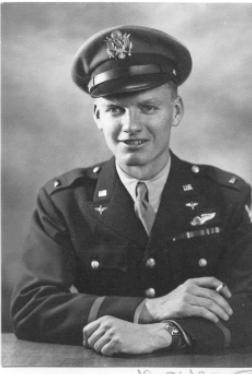|

 7. By train 7. By train
The train ride to Paris was uneventful. We flashed our passes as we pushed through the station gate in a large crowd. The German guard motioned us on, mechanically.
Bill and I were taken to a modern apartment house not far from the center of Paris. Here we spent the balance of the night and the next day and night. Our host's library contained several American classics which we read eagerly.
The following day we were moved to another apartment to begin the final preparations. That afternoon two more American flyers were brought to the apartment. We learned that they were from a neighboring bomb group back in England.
An elderly woman who lived in the apartment amused us and caused us some concern. From her rocking chair on the balcony of the third floor apartment, she spat at the German soldiers as they walked past, and cursed them not too loudly.
A distinguished looking middle-aged man gave us a briefing for the final leg of our journey to Spain. We would ride a fast express train to the southern terminus, travel by bus to a town near the frontier and cross the border the following night. Each of us had a bundle consisting of bread, food and a few clothes held together by a knotted kerchief. Again, we were to play the part of deaf mutes and our guide would be speaking for us. Our guide was making his final trip as an escort and would accompany us on into Spain. From Spain, he would go on to North Africa and join General de Gaulle's Free French Forces.
Our guide purchased tickets at the station office and we walked through the gates without showing our identification passes. Within an hour I was to learn why an inspection had not been made.
The train was crowded, and we found that all the seats were taken. Our little group was left with no alternative but to travel standing in the narrow aisle. We were rapidly joined by a number of other travelers taking positions in the aisle. This wasn't going to be a comfortable ride but, perhaps, we would be less conspicuous among all the standing passengers.
The train got underway. I found that a conscious effort was necessary to act the part of a deaf mute in this crowded railway coach. The clanking of the wheels on the rails sounded like music. Each minute was speeding us on toward freedom.
I was brought sharply back to reality. The conductor was coming down the coach collecting tickets. Immediately behind him were two uniformed Gestapo officers checking identification passes. My heart beat faster and there were butterflies in my stomach.
Was my forged identification card good enough? Would my disguise pass? The beret didn't cover much of my blond hair and ruddy face, which was definitely not French. Would four deaf mutes in one party arouse suspicion?
The Gestapo men worked down the coach. I produced my pass and waited. The officer looked at my face, studied the card momentarily, and moved on to one of my companions. Everything in the coach was in order and they moved on to the next coach. I felt a deep appreciation for the bold and detailed plan that was being executed.
The night wore on. My back pained and I couldn't sit or lie down for relief. I half-dozed while leaning against the side of the coach. The need for sleep faded with the light of dawn.
All the passengers' identification cards were checked again by the Gestapo men. I felt and looked more like the rest of the weary travelers now. Again, the identification papers passed inspection.
At mid-morning we left the train at Mont de Marsan, after riding about eleven hours. I discovered that our party had grown to two guides and about nine evadees. Two of the evadees, I found later, were Polish flyers who had escaped from a German prison camp
[Top] [Next]
|
|

